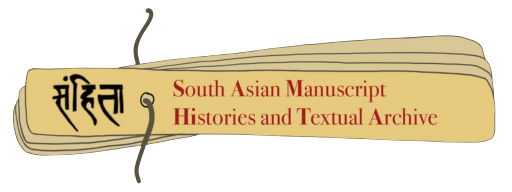Manuscripts
Search Filter
Mātr̥kā Nyāsa - (Snāna Vidhi)
EAP1023/25/6 Language : Sanskrit Scripts : Devanagari
A manual on daily rituals, including prātaḥ vidhi, sāndhya vidhi, guru praṇāma and Matrika worship, distinguishing ‘bahir’ (outer) matr̥ikā nyāsa and ‘antar’ (interior) matr̥ikā nyāsa.
Gāyatrī Rahasya
EAP1023/25/7 Language : Sanskrit Scripts : Devanagari
The first part of the manuscript has Sāyaṃsandhyopāsana from the Gāyatrī Rahasya ascribed to Paraśurāma. The second part has Śaṃkarācārya's Gāyatrī Bhāṣya, with mudrālakṣaṇa (rules of ritual gestures).
Utpāta lakṣaṇam
EAP1023/25/8 Language : Sanskrit Scripts : Newari
The first part of the manuscript has ‘Utpāta Lakṣaṇam’ (Utpāta rakṣaṇam?), which is attributed to Āryāvalokiteāśvara. It is followed by a text on astrology, and over 19 folios with illustrations of yantras and deities.
Śāntisāra
EAP1023/25/26 Language : Sanskrit Scripts : Devanagari
An incomplete manuscript of the work on propitiatory rites authored by Dinakara Bhaṭṭa (1575‒1640), son of ‘Mīmāṃsaka’ Rāmakṛṣṇabhaṭṭa; includes chapters on ‘Mahāpūjā’, ‘Nava Śatacaṇḍīsahasracaṇḍīpūjāprayoga’ and ‘Vaidikadurgārādhanā’.
Aṣṭavargasādhana
EAP1023/25/9 Language : Sanskrit and Newari Scripts : Newari
A book on astrology in pracalit Newari, whose authorship is attributed to Sugrīva.
Amarakośa
EAP1023/25/10 Language : Sanskrit Scripts : Devanagari
A work of lexicography by Amarasiṃha (active 500 c.), containing synonyms for different categories of words. The manuscript contains the first two of three kāṇḍa-s, svargādikāṇḍa and bhuvargādikāṇḍa. It was owned by Vedanātha.
Puṣpacintāmaṇi
EAP1023/25/11 Language : Sanskrit Scripts : Devanagari
A book on flowers used in different rituals, with four prakāśa (chapters). It is ascribed to King Pratāpa Malla of Nepal, but was in fact authored by his protégé, Māyāsiṃha at the Paśupatinātha temple, Kathmandu, with the sponsorship of Jayalakṣmīnarasimha. It is dated Śāka 1710, or 1888 CE.
Śivagītā
EAP1023/25/12 Language : Sanskrit Scripts : Newari
A text of Vedantic Śaivism from the Śiva-Rāghavasaṃvāda, in the Uttara Kāṇḍa of the Padma Purāṇa. The manuscript goes upto Mokṣayoga (16th adhyāya). The work is ascribed to King Siddhanarasiṃha Malla of Nepal, the scribe was Kṛṣṇa Śarmaṇ.
Kaṇṭhāvatāra
EAP1023/25/14 Language : Sanskrit Scripts : Newari
This has the 18th and 19th paṭala (chapter) of the text, which describes yoginīcakras and characteristics of yoginīs as told by God Bhairava. It is written in Pracalit Newari.
Rāghava Pāṇḍaviya Prakāśa
EAP1023/25/15 Language : Sanskrit Scripts : Newari & Devanagari
This contains the first four out of thirteen sarga-s of a prakāśa (commentary) on Kavirāja’s Rāghavapāṇḍavīya by Śaśidhara, grandson of Rudrasiṃha, who composed it at the instance of King Amarasiṃha. Kavirāja Sūri was court poet of Kāmadeva II (1182 –87) of the Kādambas of Jayantīpura (Karnataka region); the work uses śleṣa to narrate the Rāmāyaṇa and Mahābhārata simultaneously.
Kālikā Purāṇa
EAP1023/25/17 Language : Sanskrit Scripts : Newari
A complete text of the purāṇa, also called Satī Purāṇa, thought to originate in the Assam region in the 10th‒11th centuries. It includes the story of Satī, of sacred sites in Kāmarūpa, and describes forms of Devī and modes of her worship. The last two folios have a table of contents, listing over 90 chapters whose topics correspond to those mentioned by V. Raghavan (1938) and R.C Hazra (1963), though manuscripts vary in the number and division of chapters.
Prabodha Candrodaya
EAP1023/25/18 Language : Sanskrit Scripts : Devanagari
Contains all six acts of the Sanskrit play written by Kṛṣṇa Miśra in the 11th century (‘Rise of the Moon of Knowledge’), which depicts the battle in the mind of Puruṣa between Mahāmoha (‘great delusion’) and Viveka (‘discrimination), through the clash between Vedic and non-Vedic traditions, and between figures like ahaṃkāra (ego), krodha (anger) and śānti (peace). There are extensive marginal and interlinear notes of an explanatory character. The script combines Newari and Devanagari characters.













